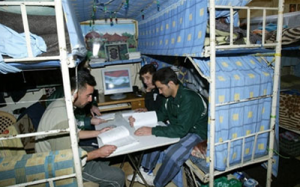The Horrors of the Holding Cell of Death

The Syrian security establishment’s detention centres are notorious. I have read stories about them written by former detainees imprisoned before the start of the Syrian uprising in 2011, and heard first-person accounts from friends and relatives arrested following the demonstrations in March of that year. Having heard so many stories, and, as a journalist, I always wondered what it was like to be detained in one of these nightmarish places.

One day in January I didn’t have to wonder anymore. It was mere coincidence that granted me the unfortunate opportunity to experience detention, if only for a day. It is an experience not many journalists wish to live themselves. One cannot know the true reality of detention until one has smelled the ghastly stink and seen with one’s own eyes how dozens of detainees are crammed into a cell that would not fit a quarter of them comfortably.
My experience began when one of the security agents at a checkpoint in Damascus became suspicious of me after seeing my Identification card. Syrian I.D.’s list the holder’s city of origin – and I happen to be from one of the rebellion’s strongholds. The soldier called for backup and I was taken to a security detention centre. When the investigator saw a clip of children cursing President Bashar al-Assad that I had forgotten to delete from my mobile phone, he began to interrogate me more intensely and eventually sent me to the holding cells in the basement where they kept detainees. The price for the video clip was four slaps and three punches, one of which caused my eye to swell and bulge until I looked like a cartoon character.
As I stood in the interrogation room next to the cell, blindfolded, awaiting my turn, I heard the sounds emanating from the torture chamber nearby. They were not human voices, but something close to the wail of dying beasts.
Putting my face against the door, I could smell a musty odour. I knew what it was immediately: the smell of detention, which I had smelled on a friend of mine who I hugged after he had spent six months in the regime’s dungeons.
At one point, the adjutant in charge of me and the other prisoners asked one of the other cell supervisors to “bring out the dead.” I smiled to myself, thinking he was just trying to scare us. But less than a minute later, some of the prisoners were carrying the body of a detainee that had been partially covered with a brown blanket. The corpse was all that remained of a man ravaged by hunger and sickness; his bones were covered in patches of diseased skin from head to toe.
I would see similar skin patches and worse when I set foot in the “cell of death,” as the prisoners called it. 164 detainees were crowded into a single room not bigger than thirty square meters. Veteran detainees sat along the walls, while the rest formed a human pile that took up the entire room. In my mind, I was laughing, comparing the hall in the Meridian Hotel in Beirut where I had taken my exam just that morning to the “cell of death” where I would now spend the night.
Fortunately, I spent only one night in detention, but during that time I heard stories and saw things that will haunt me for as long as I live. Most of the detainees had been captured in raids or taken at military checkpoints in areas that rebelled against the regime. Some were either going crazy or completely mad, others ravaged by disease. It was painful to see how the inhumane conditions and suffocating overcrowding had turned the cell into a jungle where only the fittest survived. Every few minutes a fight would break out over some frivolous issue, such as stepping on someone’s foot. One of the prisoners, a young man not more than 17 years old, kept urinating involuntarily every few hours. As if this weren’t enough, the other prisoners would start slapping him every time it happened.
A coincidence led me to discover that an acquaintance was being held in the same section. He had been there for 22 days and slept near the door to the cell overlooking the main gate, allowing him to keep an eye on who came and went. In the three weeks he’d been there, he had counted 44 bodies, most of them belonging to men who had succumbed to chronic illness after being denied access to doctors and medicine.
They decided to release me after one day. I do not know why they were merciful to me, but I know that fate was kind. I quickly collected phone numbers from my cellmates so I could reassure their parents they were alive. I picked up my personal belongings, minus a few valuables. Before I left, the investigator told me that I was a “good citizen.” The main gate then opened. It was a gate that, when closed, does not reveal to outsiders what is happening inside that detention centre.
